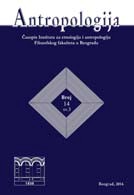O UTICAJU BENEVOLENTNE ASIMETRIJE NA METODOLOŠKI DIZAJN ISTRAŽIVANJA NA PRIMERU JEDNOG TEKUĆEG INTERDISCIPLINARNOG
ISTRAŽIVANJA ROMA U SRBIJI
ON THE INFLUENCE OF BENEVOLENT ASYMMETRY ON THE METHODOLOGICAL DESIGN OF RESEARCH, AS EXEMPLIFIED BY AN ONGOING INTERDISCIPLINARY RESEARCH PROJECT ON THE ROMA POPULATION IN SERBIA
Author(s): Miloš Milenković, Isidora Jarić, Ognjen RadonjićSubject(s): Anthropology, Customs / Folklore, Cultural Anthropology / Ethnology, Methodology and research technology, Ethnic Minorities Studies
Published by: Институт за етнологију и антропологију
Keywords: research ethics; the principle of benevolence; politics of knowledge; asymmetry; adisciplinarity; methodology of the social sciences; minority populations; research; reflexivity; fieldwork; ethics;
Summary/Abstract: While standard ethical and political restrictions with regard to publishing or not publishing results of research conducted among marginalized populations take up a significant amount of space in the methodology of socio-economic and socio-cultural research, their influence on the design of the research itself has, up to now, not been given too much thought in the methodological curriculum of the relevant disciplines nor has it been widely considered in Serbian methodological literature. The article considers the influence of ethical and political considerations on method, or more precisely, the design of the research, as seen over the course of an interdisciplinary project researching the Roma in Serbia. The article also gives an outline of the principle of benevolent asymmetry, articulated over the course of work on this project. The hypothesis - that method in the strict sense cannot be autonomous of ethical and political factors has been tested and confirmed, both in prefieldwork and post-fieldwork considerations. The analysis does not emphasize isolated typical questions posed by professional and research ethics, but their interrelationship with the conservatively understood methodological design. During the research process it was confirmed that gaining informed consent significantly distorts the type and quality of information provided by the interlocutors. Furthermore it was determined that asymmetrical benevolent research which has the objective of aiding the studied community, is significantly complicated by the refusal of certain informants, especially ones who enjoy a certain reputation in local communities, to remain anonymous. This also invites contextual adjustment of ethical standards of the research. Finally, it turned out that causing harm to the studied community can be evaded by not sticking to ethical protocols and guidelines as opposed to adhering to them as is commonplace. What merits further debate and discussion are benign self-censorship as a form of calibrated care as not to cause the informants, involved researchers and institutions harm on the one hand, and on the other postempirical adisciplinarism as a measure of bridging the gap between academic and applied research in terms of integrity.
Journal: Antropologija
- Issue Year: 14/2014
- Issue No: 3
- Page Range: 27-44
- Page Count: 18
- Language: Serbian

